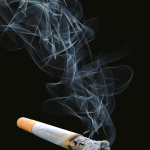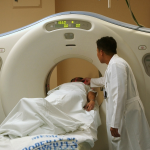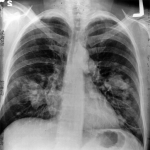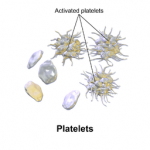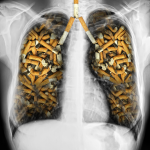Just over a year ago I wrote about the Biden Administration’s plan to ban menthol. As Dr. Janet Woodcock, the acting FDA commissioner stated [1], “Banning menthol—the last allowable flavor—in cigarettes and banning all flavors in cigars will help save lives, particularly among those disproportionately affected by these deadly products.” A new study suggests that her statement with respect to those disproportionately affected is wrong. Let’s see what a new study concludes.
lung cancer
The American public has been concerned with radiation safety as far back as the tragic story of the “Radium Girls,” female factory workers who contracted radiation poisoning from painting watch dials with self-luminous paint between 1917 and 1920. While there is substantial data demonstrating powerful carcinogenesis from high-dose radiation, e.g., an atomic bomb explosion, can small doses of radiation cause cancer? Some believe that they can.
It's impossible to know for sure if Rush's cigar smoking caused his lung cancer, but it certainly increased the risk, even though cigar smokers don't inhale the smoke.
Should we turn our nose up at using a dog's keen sense of smell as a cancer screening tool? Or to help identify relevant biomarkers that scientists should be isolating for diagnostic purposes?
We would think a physician could use guidelines to advise a patient about screening. But what if the guidelines are good for society, but not necessarily as good for the patient? Three separate articles in the Annals of Internal Medicine clarify the dilemma, without providing a solution.
Platelets, minuscule white blood cells that are crucial for normal blood clotting, may be useful as an early screening test for lung cancer — thus possibly avoiding the necessity of extensive surgery and long-term treatments. An innovative use of so-called Tumor-Educated Platelets seems potentially valuable for the early detection of lung cancer, and maybe for other cancers as well.
The Centers for Disease Control and Prevention is on a recent publishing push. It involves cancer prevention efforts, promotion of current statistics and encouragement of comprehensive plan implementations -- on all governmental, personal and public fronts.
Heavy smokers and ex-smokers are at increased risk of lung cancer. Low-dose computed tomography screening can detect tumors at an early stage. But how often should a smoking-compromised person undergo this? A new study suggests that for those who are negative at the first LCDT test, once may be enough.
Could diet be responsible for lung cancer? We know the leading cause is cigarette smoking, but what about the 10 percent or so of cases that occur in non-smokers? A new study suggests that a diet high in foods with a high glycemic index may be a culprit. Don't go on a potato and rice-free diet just yet. This study is just about worthless.
Reality TV star, "Mob Wife" Angela Riaola died of extensive cancers caused by her long-term smoking addiction. Why can't our scientists find effective ways to prevent or treat this key public health crisis: cigarette smoking addiction?
Many homeowners and those buying property are concerned about potential radon-related health issues, specifically having to do with radiation exposure as a cause of cancer. A new publication by Dr. Jerry Cuttler, an advisor at the American Council, dispels that concern using science.
A new study of non-solid lung nodules, followed via annual spiral/low-dose CT scans among smokers and ex-smokers, shows that that type of nodule can be safely followed with imaging, avoiding needless surgical interventions. Some lung cancers were found: none caused significant illness.
